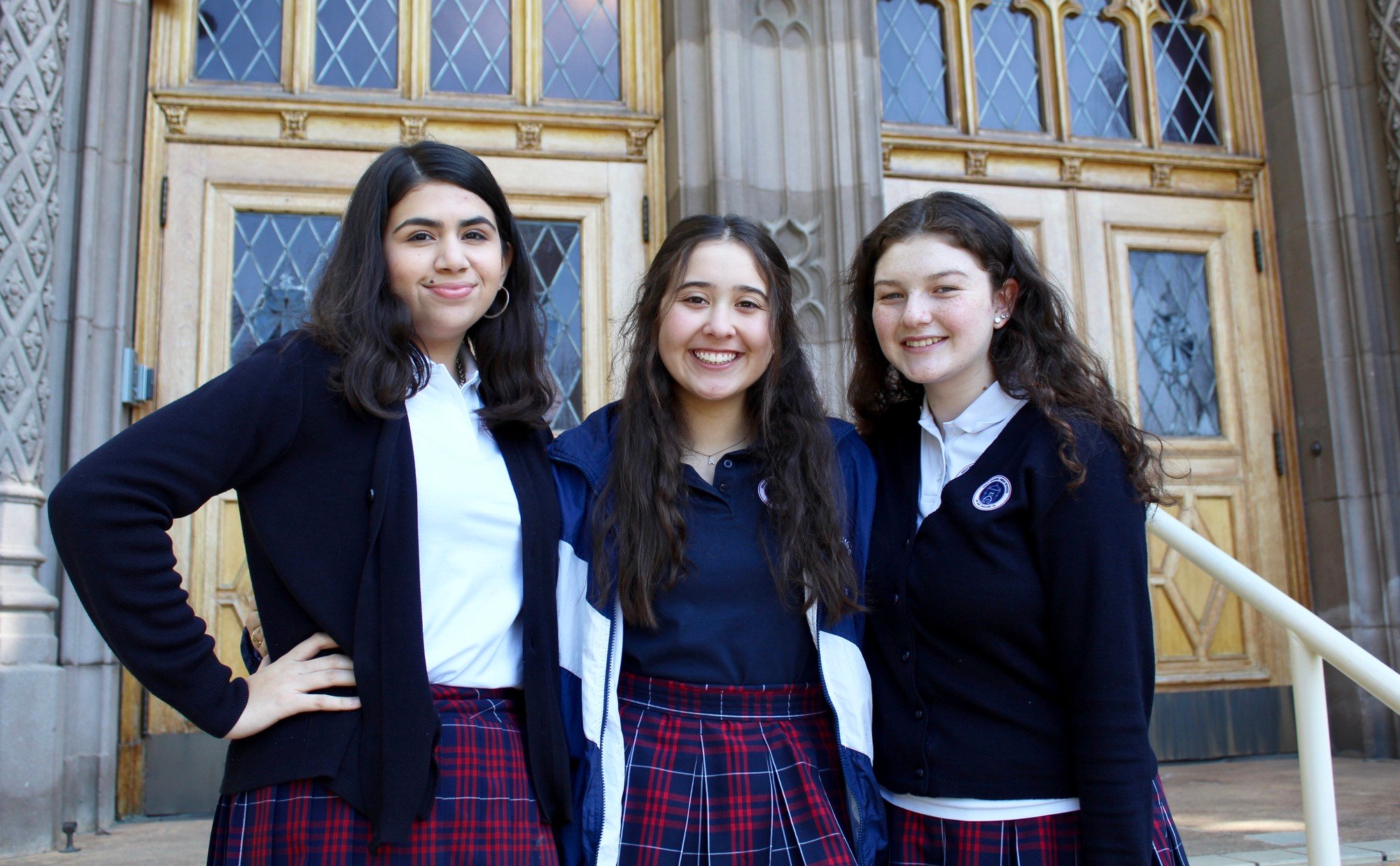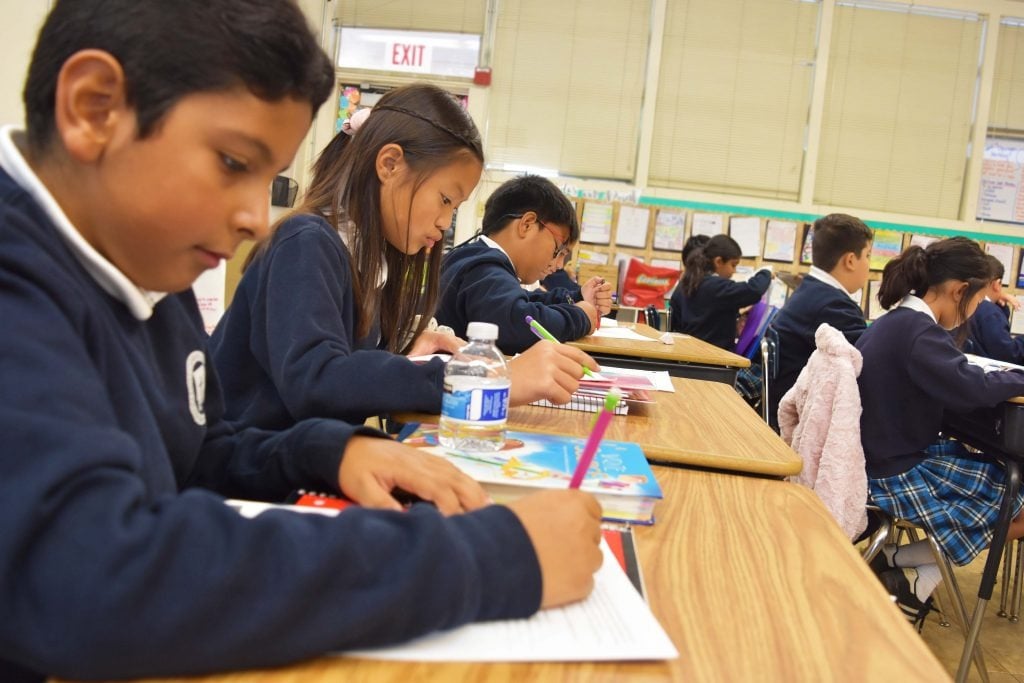The Spirit is at work in our schools
-

“Our children have this encounter with Christ on a daily basis in school,” says Dr. Andrew Currier, superintendent of schools for the Oakland Diocese, “and that's why we're here.”
That sentence may capstone what the 45 schools within the diocese accomplish, but it barely skims the surface of what students, teachers, principals and everyone who touches school life co-create within the lives of the nearly 15,000 young people they encounter each day during the academic year.
Sometimes, these accomplishments involve both immersing young people like those at Christ the King School in Pleasant Hill into both Greek and historic church philosophers, while helping them develop their own public speaking skills and build confidence in the same program.
“We're all very ripe for Socratic thought, building higher order thinking, exercising active listening skills, positing and reflecting on ideas, immersing into deep thought whether it be Augustine or Aquinas or all of the greats that way,” said Joe Silveira, principal of Christ the King School in Pleasant Hill.
“We have an annual speech contest where fifth through eighth graders are judged within the classrooms, objectively, culminating into an event at the church. We have a thematic option every year, and it's usually grounded in Scripture or faith,” Silveira explained. Beginning students at an early age in being a lector at Mass, as well as understanding the techniques of public speaking is “one of the gifts of Catholic education,” according to Silveira.
Often, the accomplishments come from what’s seeded in students’ minds and hearts through the work of leaders and mentors like those found at St. Leo the Great School in Oakland.
Having Jesuit Father [Stephen] Barber as St. Leo’s president has brought a difference that has been transformative, said St. Leo’s principal, Sonja Simril.
“UC Berkeley college students tutor our students during the day and in our after-school program. One of the students from UC Berkeley said they worked at other schools in the same program, but she heard our children say, ‘We're going to improve in this area, but we're going to pray about it as well.’ These students follow the motto of our school, which is, ‘Do your best and let God do the rest.’”
 Holy Names High School students pose outside. Photo courtesy of the Catholic Schools OfficeMeeting families’ needs
Holy Names High School students pose outside. Photo courtesy of the Catholic Schools OfficeMeeting families’ needsOccasionally, it’s what schools are building around the students themselves, such as St. Patrick School in Rodeo, with a new performing arts center for students, while expanding their ability to serve those with special needs.
It's about “making sure that we're meeting the needs of our students who have the right to a Catholic school education, but at the same time may need a little extra support,” said school president Kelly Stevens.
Those accomplishments, and the spiritual fruits coming from them, keep families and students coming to Oakland Catholic schools year after year.
“We have stabilized in terms of enrollment over several years, which has been a real blessing after several decades of decline in enrollment,” Currier said.
“Our programming is getting stronger every year. We're taking a data-informed approach to ensuring that what we're doing is effective. That is not only math and reading, but also our religious education as well.”
 Students hard at work at St. Clement School. Photo courtesy of the Catholic Schools Office.What does ‘moral’ look like?
Students hard at work at St. Clement School. Photo courtesy of the Catholic Schools Office.What does ‘moral’ look like?St. Isidore School in Danville is taking that faith education to heart, openly discussing the importance of virtue through an Openlight educational initiative, developed by the Dominican Sisters of Mary, Mother of the Eucharist, connected to the school’s Faith Families program where younger and older students relationally collaborate in their experience.
“We thought, ’Let's start little.’ We choose one virtue of the month, and through that virtue, we learn of what it means, leveled for little ‘teenies’ all the way up to eighth grade,” said Joanie Gerberich, a winner of the diocese’s St. Francis de Sales Award as a third-grade teacher at St. Isidore.
“The program is wonderful in that it says, ‘What does it [morally] look like?’ We have examples, and we can talk about it and teach what it looks like. That's something that is so powerful.”
The roots of these experiences and accomplishments come from what Currier sees as a differentiating factor for Oakland Catholic Schools, the focus on virtue and a structure of both compassionate care and accountability for students.
“That has really inspired families to come our way, knowing that we have a traditional value set, that we have a moral foundation, and that we also can point to a true good and evil. I think people really need that,” said Currier.
Currier said that to accomplish that goal, the district is collaborating with other dioceses across the state to deepen use of historic Catholic liberal arts intellectual tradition, engaging with the Institute for Catholic Liberal Education.
But beyond the mind, perhaps the greatest accomplishment Currier sees within Oakland Catholic Schools is the number of students who enter schools from outside the Catholic faith, and graduate as Catholics.
“We've got families choosing Catholic education who aren't necessarily Catholic. We're seeing some conversions, baptisms, and entry of our students into the sacramental life of the church,” he said.
“When our students go to Mass on a weekly basis with the school, they want to be part of that. They see their classmates participating in the sacramental life, but they also get exposed to this Gospel truth in the classroom setting. I think they want to be part of that.”
It helps when you have teachers like St. Francis de Sales Award winner Azenith Ramirez, who leads second grade at St. John’s School in San Lorenzo. She offers a “Mass Passport” to students, encouraging them to go to Sunday Mass. But she has stretched her skills to musically involve her students in the Mass.
“My principal invited me to lead the choir of our school. I am not a music major,” she admits.
“I just have a love for music, and songs like a gospel song every day when we do Catholic formation. So now I started the church choir, inviting my students to really sing during our Wednesday school Mass. How the kids participate in the Mass is really heartwarming to see them being more involved with the Eucharistic celebration.”
Students gather outside at St. Bede School. Photo courtesy of the Catholic Schools Office.Service
Catholics’ baptismal call is to extend that sacramental life in service to the world – a value that Currier and Oakland Bishop Michael C. Barber, SJ, both desire to instill in students for their entire lives.
“Our high schools and our middle schools are really showing a commitment to service, to the Gospel values, to corporal works of mercy,” said Currier.
Students at schools like Bishop O’Dowd High School in Oakland are encountering the face of Christ through thousands of hours in the school’s service learning program, according to Kim Walsh, the school’s president.
That program accompanies what Walsh calls “a leading environmental science and sustainability program responding to the papal encyclical, Laudato Si’.” This tracks alongside the schools’ confirmation program – the first of its kind at an Oakland Catholic school.
“When you have students for about 180 days a school year and you layer that on the sacramental participation, our students are living the Gospel values,” Currier explained. “I think that that's what keeps people. That's what draws people.”
It is drawing people from all backgrounds to Oakland Catholic schools.
 “You see people from Northern Africa, all parts of Asia, Australia, Europe, South America, Central America, all coming through the hallways in Oakland, but their unifying factor is this love of Christ, the celebration of the sacrament,” said Currier. “That's what I'm really excited about, is that Oakland Catholic Schools have this beautiful, true diversity, but this unity in Christ.”
“You see people from Northern Africa, all parts of Asia, Australia, Europe, South America, Central America, all coming through the hallways in Oakland, but their unifying factor is this love of Christ, the celebration of the sacrament,” said Currier. “That's what I'm really excited about, is that Oakland Catholic Schools have this beautiful, true diversity, but this unity in Christ.”Unity spreads Christ’s mission across each school, infusing sacramental life, virtue and compassion into a way of life for each student, planting lifelong seeds that will grow throughout their own journeys with and to God.
As Currier puts it, “The Spirit is at work in our schools.”
Learn more about our Catholic Schools at csdo.org.
